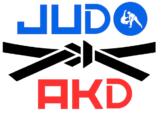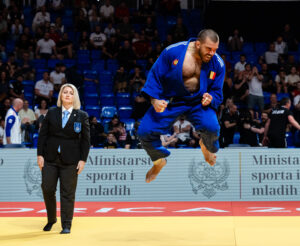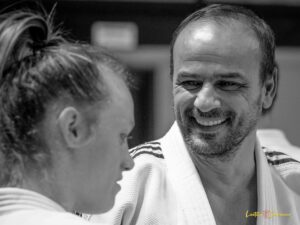[FRA – Cet article est une reprise de la version anglaise originale d’un papier publié en juillet 2019 dans le bimestriel français L’Esprit du judo. Cette version anglaise a été mise en ligne le même mois dans l’ancienne version du site Internet de l’EDJ et reprise par le site JudoInside, mais n’était plus visible depuis la mise à jour dudit site à l’automne 2020. Le voici à nouveau.
ENG – This article is a reprint of the English and original version of an article published in the French bimonthly L’Esprit du judo in July 2019. This English version was put online the same month on the old version of the EDJ website and taken over by the JudoInside website, but no longer appeared since the redesign of the said site in Autumn 2020. Here it is again.]
Continental golds. World gold. Olympic gold. The giant Czech was only 25 when he settled the question in the U100 kg category. Three years later, he’s already European champion of the O100 kg (in 2018, in Tel-Aviv, Israel) and highly motivated to keep climbing till the summits of those new mountains. A category dominated since 2007 by the Teddy Riner-Everest, twice Olympic and ten-times World champion. We went to Prague to meet in person one of the only contemporary currently allowed to believe that he can beat the French monument. – JudoAKDReplay#003.
See spring again. For our first randori together, Lukas Krpalek was 20. Double junior World champion, a senior CV already in a “beware-I’m-coming” mode, he was nothing less but fire on the mat. Almost without a pause, his attacks’ rhythm was unusual for someone this tall (1,97m). His legs cut the air in some 180° amplitude and, for his opponent, the call was close between the way of flexibility and elongation problems. At that time, however, it was still possible to throw him on a side with a ko-soto gake or an uchi-mata sukashi at the beginning of a sequence when he was not 100% focused on his move. But, right after, you had to deal with a four times harder storm coming back at you. On the mat shores, as it still is today, his coach Petr Lacina was screening it all with his Master-of-the-Long-Time’s glasses. Right after the “soremade”, he just reminded the young colossus that “sometimes, less is more”.
Eight years and two Olympiads later, this is now one of World’s tatami bosses that we meet again in his USK Prague’s Folimanka Dojo, where he trains most of the time since 2007. Olympic champion, World champion and three times European champion, his name and his country’s make one. He’s on every wall, every poster and every local kid-eyes’ star. In 2019, Lukas Krpalek is Czech judo.
“If I managed to win my bronze contest in Rio, it’s also because Lukas’ level was so above mine during our semi-final. I wasn’t that frustrated when came the moment, critical as usual, to re-focus for the bronze fight.” That tribute comes from Cyrille Maret. The French is one of a few who managed to defeat the Czech sumi-gaeshi/osae-komi king on his kingdom: the ground work. “He’s oppressive and bulky, with a clever sense of power. His good shape allows him to exhaust us and always end strongly” says the double World medallist from Belgium Toma Nikiforov, who only beat him once out of their six fights together.
Lukas is born in the autumn of 1990, exactly two days before the first anniversary of what History remembers as the official beginning of the Velvet Revolution. Second son of an entrepreneur and a textile factory employee, his childhood is spent outdoors. His headquarter? Jihlava, about 130km south-east of the capital of a country named Czechoslovakia until 1993. Ice hockey on frozen lakes, ski, football, basket-ball, volley-ball, swimming… “Sports are my life” admits that hyperactive lefty who studied carpentry. Detected for his judo abilities – despite the fact that him and his brother both believe for months that their uncle has enrolled them into karate classes! -, his mother allows him to go to USK Prague the year he turned 16. Pavel Petrikov and Jaromir Jezek, both 20 years old, are Czech judo’s locomotives at that time.
At the end of his first season, Lukas’ heart is still in love with ice hockey, but he asks his club permission to have his elder brother Michal come, as he remains his “best judo partner”. Request accepted. Bombshell in the mortarboard. The rest is a matter of time… Step by step, Lukas becomes the road captain of a convivial team. A kind of self-sustaining village which enjoys nothing more than heading altogether to the ice rink on Sunday evenings, or a judo followed by sauna and a directly out-of-the-fridge frozen can of Pilsner or Bransky.
His improvement curve is exponential. He wins crescendo the three most important championships of the previous Olympiad: Europeans 2013 and 2014, Worlds 2014 and Olympics 2016. “To say it briefly, he owns all the major titles I’m still missing” notes the bit gloomy triple European Dutch champion Henk Grol, still one of the few who manages to beat him more often than the reverse. “He’s well prepared. That’s his main strength. When you fight him, he’s ready. If you are not ready, be sure that he won’t miss” adds the 34-years-old fighter from Haarlem, now an O100kg like Lukas for “a few kilojoules more”.
During Teddy Riner’s pause in 2018, the young father and carp fisherman ticked the first box out of three of his 2020 project’s list: the European title in Tel-Aviv. Will he manage to challenge the French scarecrow for his comeback? “Maybe he will need a few extra kilos. He weighs as much as Tushishvili but is not as explosive. Despite his speed, he could be crunched” says Cyrille Maret, who is used to fight and train with the best from the two categories. One thing is for sure: even if he has already won it all in his former category, Lukas Krpalek wants more. As he said at the end of our first randori, he wishes it, says it and sweats for it. He even paraphrases the famous French writer Victor Hugo in a much-improved English: “The best years of a man’s life are the years he hasn’t lived yet.”
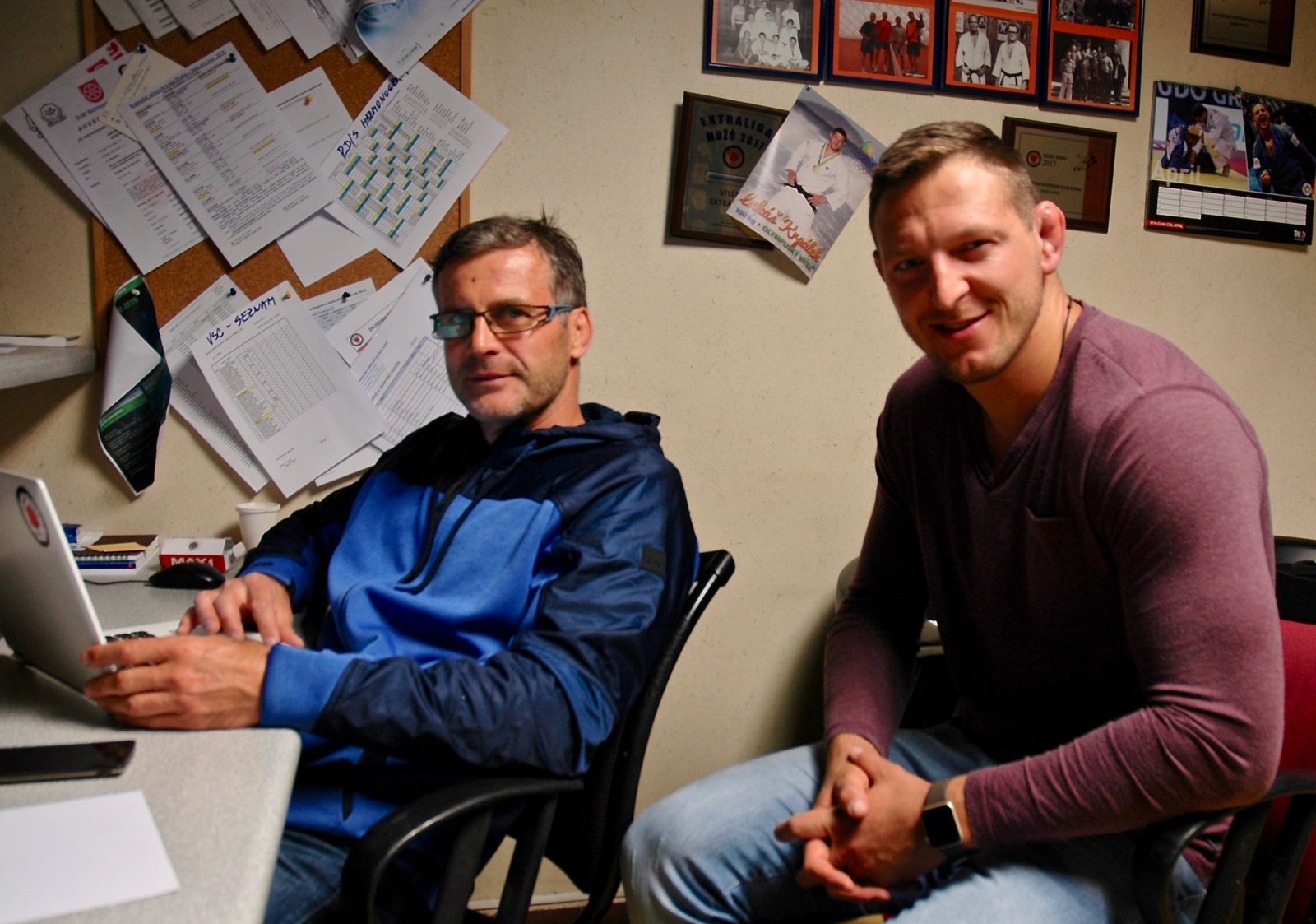
Lukas, we’ve been meeting for around a decade now all around the globe, between championships, tournaments and training camps. Let’s play a game: you tell me about the main steps of your career, and I’ll tell you if they fit with the ones that I have witnessed, as a journalist. Okay for you?
Okay let’s try! [He reflects] For me there are five moments. The first in 2008, when I win the junior European Championships and the junior World Championships. It confirms the potential everyone here had seen in me. It gives me confidence for the future. The second was the London Olympic Games in 2012. It had been my dream to fight there since Beijing. I watched two fighters I had already beaten be part of it. In London, I did even better as I managed to beat Takamasa Anai who was World champion two years before, for the first time. This victory was really an accomplishment. Participating into a competition of such level was not a goal anymore. Suddenly, good results even seemed possible.
And the third?
I’d say my European title in Budapest in 2013. Until that competition, I was often close but rarely on the highest step. This time it was my time. Moreover, I beat guys who always beat me before like Elmar Gasimov from Azerbaijan or Henk Grol from The Netherlands… The next steps were obviously my World title in 2014 in Chelyabinsk and the Olympic one in 2016 in Rio. I think that’s it. What about the steps you noticed?
In addition to those, I see four other steps. Your semi-finals in Rio 2013 and in Chelyabinsk 2014, plus two other milestones in 2015.
Really? Please explain, it’s interesting…
In Rio 2013, after your were defeated in the semi-final by Henk Grol, you seated a long time in the corridor, a towel on your head. For me it was clear that you would work a way around this…
[He smiles] Well seen… Until that year, indeed, I couldn’t find the solution against Grol. Prior to this, I had finally managed to beat him at the Europeans in April. So yes, this new defeat against him in Brazil was at the same time a real deception, but also the opportunity to question myself. Years after, I realise how important this step was for my progression.
Another time now. In Chelyabinsk 2014, your semi-final against Tagir Khaybulaev. Prior to this, the Russian was just astonishing a couple of weeks before during the Grand Prix of Mongolia. And again in Chelyabinsk, in quarterfinals against that same Grol, in front of his own crowd. I was really impressed by the way you tightened the game on that contest. It was like a handover between the reigning 2012 Olympic champion and the one you would become two years later in Rio…
[He smiles again] That’s true, too! Now that you remind me of that contest, I realise how Khaybulaev was an important character in my career. In London, right after I defeat Anai, I control my quarterfinal against the Russian until the very last seconds of the fight. I try to save some precious seconds on ne waza when Tagir finally takes me on osae-komi on the soremade. At the end of the day he’s Olympic champion and I rank seventh… This defeat haunted me for the next two years. Nights and days. It gave me a reason to wake up every single morning. So the shido I beat him with in 2014, in front of his own crowd, was not only my ticket for my first World final. It was also the end of a two-year-long nightmare. A real liberation.
Finally, I notice two decisive moments in 2015. The first in August when you lose your World title in semi-final and the bronze against two German fighters that you would have normally defeated…
[A silence] You’re right, again. It’s true that the season after my World title is delicate. I put on weight and go through a left knee surgery in December. Then I miss basic training and it is quite hard to endorse correctly my red backpatch. I lose against opponents against whom I should not lose anymore – I mean opponents I didn’t feel allowed to lose against anymore. Oddly enough, my results remain quite flattering [He ended 2nd at the Masters in May and at the European Games in June, ed.]. But all this was far from what I really felt. Did I unconsciously relax too much after my 2014 World title? Did it take me too much time to focus again? Maybe both. Anyway, these fails were also good warnings for me. They pushed me to gather myself for the final countdown until Rio…
The second 2015 moment, a couple of weeks later, is the tragic death of your fellow countryman Alexander Jurecka…
That’s sadly true too. The drowning of my friend Alex next to me during a diving practice with the team in Italy was also a turning point. You said fellow countryman but you have to know that Sasha, for me, was much more than that. He was my roommate since cadets, almost a second brother, you see… [A silence] How can you not look at life differently after that? How can you not have that will to take all that you can after that?
How does his memory help you, after that?
In Rio, I have a picture of him in my pocket. Before each fight, I take it out and speak to him. My draw is tough with opponents like the Portuguese Fonseca, whose stocky size doesn’t suit me, then the former World champions Rakov and Haga. In the semi-final, I face the World #1 Cyrille Maret from France, who happens to has defeated me four times over our six prior contests. Right before entering the call room, I show Alex’s picture to my coach and tell him: “I’m one victory away from that Olympic medal I’ve been waiting for so long. No mortal will stand between my dream and I.” Two fights later, on top of the podium, I have that gold medal around my neck and the picture of Alex in my hand. Eleven months have passed since the drowning, and he is still with me.
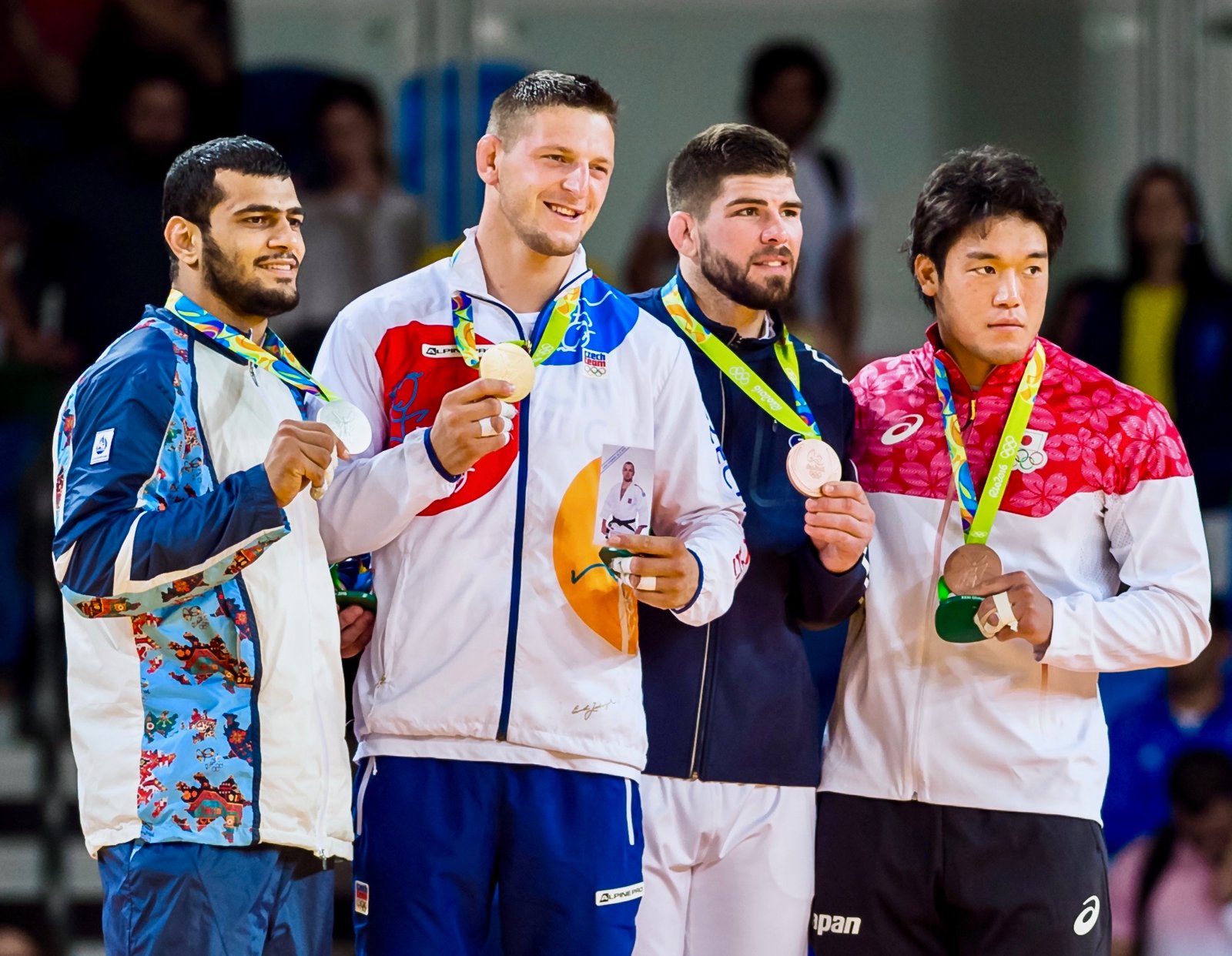
This picture of you on Rio’s podium reminded of the Japanese Inoue after his Olympic title in Sydney 2000. He showed then to the world a picture of his mother, who had passed away a couple of months earlier [Also in 2008, on Beijing podium where he ended third aged 19, Teddy Riner from France showed a photo of a friend of him, Frédéric Escalante, who was fighting against leukemia at that time, ed.]
Kosei Inoue… There is so much to learn from that man. The judoka he was, the manager he has become and, overall, all these values which were about to be forgotten and that he put back at the center of the agenda. Do you know that one day, after a Prague Open, all the venue was empty and he stayed alone on the mat to clean up all what his countrymen had left behind them? And he was their coach! When you see that, you know that you must learn from people like that. He’s a real inspiration for me.
Maybe you’re also an inspiration for him, who knows… Because there is something quite fascinating about you for most of the judokas I talked to while preparing that interview: with your size, your weight and your results, how do you train? Do you have enough daily opposition to push your limits?
[He smiles] You know, high level judo is just a matter of thorough organisation. It’s obvious that I will never find the amount and the variety of sparrings that my Japanese, French or Russian opponents have daily in their own dojo. In spite of that, the international calendar allows anybody to adapt and smartly plan a season. Basically, when I’m in Prague I work a lot on technique and physical condition; in training camps, I do a maximum of randoris.
Indeed! I remember you last year during a training camp in Austria. You ended a terrible randori with the Olympic and World medallist Aleksander Mikhaylin from Russia, and started directly another one with a young German who had just rested during your fight…
I’ve got a principle: you can be a big champion or a newcomer. If you invite me and if I’m free, I will never say “no”. And you can be sure that I will be at 150%. Why? Because it’s the price to pay to be surprised by the opposition and to adapt to whatever profile I have in front of me… This unfiltered approach can be risky too, especially in Japan where I have to fight fifteen opponents in a raw. I must deal with intensity, in order to avoid injuries.
Ne waza transitions are also one of your favourite moves. Where do they come from?
I always loved that. Ever since I started judo at SK Jihlava. To be honest, I think one of my highest fears was always to take ippon on tachi waza. So, to avoid this, I decided to make the ground a kind of kingdom of mine. My strategy was to bring my opponents down there. I included that quite quickly in my tactical options. It relaxes me, in fact. And it frightens my opponents to the point that, after a long ground sequence, when we come back to tachi waza, they also feel uncomfortable [He laughs].
You won a lot with this transition skills when you were U100 kg. Now that you moved to O100 kg, is that weapon still efficient?
Yes, because the heavyweights are still surprised, when the U100 kg were starting to know my music. This being said, my current weight is sometimes seventy kilos lower than my opponents’. And all is not only a matter of levers at this level [He smiles]. This reality gives me an obligation to stay on the lookout, during training camps for example, in order to catch and try any new transition. You know, solutions are quite often right in front of us, you just have to open your eyes. Judo never ends.
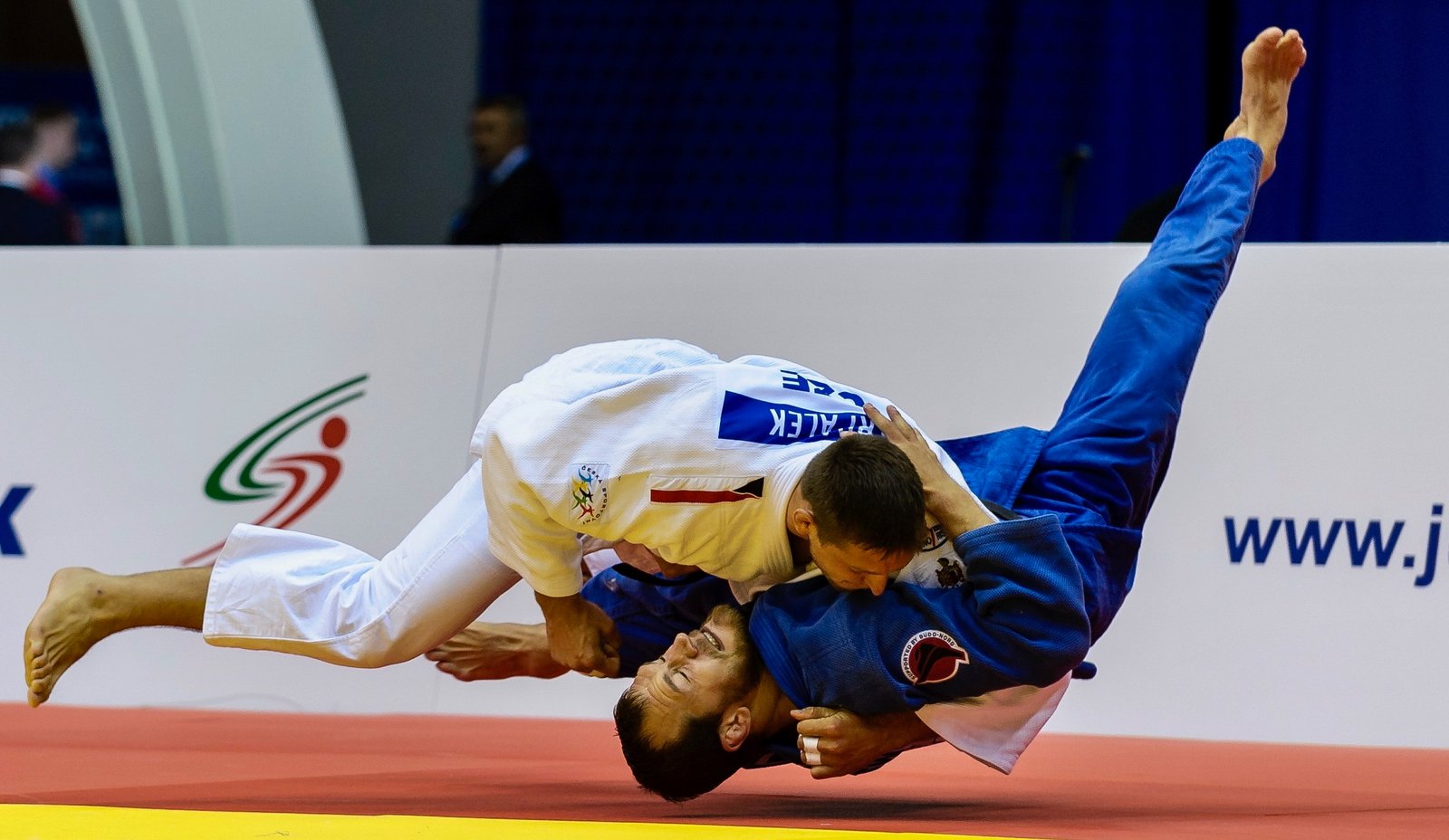
Another question I cannot avoid to ask you: Teddy Riner. Do you manage to put him out of your thoughts during your daily preparation or, as some other champions told us in the past like Rafael Silva from Brazil [cf. EDJ45, July-August 2013], has he become a kind of obsession?
[Long silence] You know, there are three reasons why I moved up to O100 kg category. The first one is obviously weight, because it had become very hard for me to deal with diets. The second one is motivation, of course, because I won all in U100 kg. And yes the third one is Teddy, because going for the king of the queen category is indeed the big challenge. But I have to remain clear-headed too: before being ready for him, I have to be able to beat all the other opponents. And this, believe me, is not that easy when you only weigh 112 kg like I do.
Not heavier?
It’s a matter of balance. Heavier, I’m slower. I have to find the best compromise between speed and power. With 112 kg today, I’m good, even if my legs strengthening changed things in my judo: I cannot lift my leg as high as I used to a couple of years ago on uchi-mata for example. My current weight is the one I was off competition during my last U100 kg years. This time 112 kg is the weight I decided. It’s a big step.
Another thing seems to have changed you for the best: fatherhood…
It changes everything, you should say! My son Antonin’s birth, one month before Rio, remains one of the best moments of my life. Since that day, I know that, winning or losing, it’s just sports. My family comes with me sometimes during international training camps and they were even there during 2018 Baku World Championships. Knowing that Antonin, his little sister Mariana and my wife Eva are close to me gives me tremendous power. Judo brings me a lot of happiness but this is just another level [He smiles].
2020 already looks like a double challenge for you. There will be the Olympic Games in Tokyo and a couple of months before, “your” city of Prague will host the European Championships. Doesn’t this home rendez-vous put too much pressure on you during an Olympic year?
You know in Rio I was the flag bearer of the whole Czech delegation, and I won. This being said, it’s true that this double 2020 challenge won’t be easy for me, because there will be a lot of expectations. But I have to look further than myself and understand that to host such an event is good for Czech judo in general. My part in it will be to transform positively that pressure. And make those European Championships a good warm-up before the Games.
You will turn 30 at the end of 2020. Do you look beyond these Olympics?
It’s a bit too early. Thirty years old is supposed to be young in our categories [He smiles]. Maybe I would like to continue, yes. Maybe in O100 kg, maybe in U100 kg. What is sure is that, after my career, I would like to run my own club and teach children. I have a sense for it.
One word about Petr Lacina, who has been your coach for over a decade now. I think I have always seen you together. After so many years, what do you talk about during the few minutes before a contest?
Indeed Petr Lacina is my coach since 2008. He knows me perfectly. Prior to a big match, we speak about it briefly one hour before. Then, the closer the contest gets, the more we talk about other things: house, family, gardening, DIY… I can be quite stressed and my coach knows that I need a bit of lightness. About the fight, he will just give me short bits of advice close to my ear right before entering the mat. Ideally, we don’t even discuss about it. Maybe this is the key, after all: you don’t need to speak about a fight. You go for it and that’s it. – Written and translated by Anthony Diao. Overview by C.T. Opening picture: Paco Lozano.
More Replays in English:
- JudoAKDReplay#001 – Pawel Nastula – The Leftover (2017)
- JudoAKDReplay#002 – Gévrise Emane – Turn Lead into Bronze (2020)
- JudoAKDReplay#004 – How Did Ezio Become Gamba? (2015)
- JudoAKDReplay#005 – What’s up… Dimitri Dragin? (2016)
- JudoAKDReplay#006 – Travis Stevens – « People forget about medals, only fighters remain » (2016)
- JudoAKDReplay#007 – Sit and Talk with Tina Trstenjak and Clarisse Agbégnénou (2017)
More articles in English:
- JudoAKD#001 – Loïc Pietri – Pardon His French
- JudoAKD#002 – Emmanuelle Payet – This Island Within Herself
- JudoAKD#003 – Laure-Cathy Valente – Lyon, Third Generation
- JudoAKD#004 – Back to Celje
- JudoAKD#005 – Kevin Cao – Where Silences Have the Floor
- JudoAKD#006 – Frédéric Lecanu – Voice on Way
- JudoAKD#008 – Annett Böhm – Life is Lives
- JudoAKD#009 – Abderahmane Diao – Infinity of Destinies
- JudoAKD#010 – Paco Lozano – Eye of the Fighters
- JudoAKD#011 – Hans Van Essen – Mister JudoInside
- JudoAKD#021 – Benjamin Axus – Still Standing
- JudoAKD#022 – Romain Valadier-Picard – The Fire Next Time
- JudoAKD#023 – Andreea Chitu – She Remembers
- JudoAKD#024 – Malin Wilson – Come. See. Conquer.
- JudoAKD#025 – Antoine Valois-Fortier – The Constant Gardener
- JudoAKD#026 – Amandine Buchard – Status and Liberty
- JudoAKD#027 – Norbert Littkopf (1944-2024), by Annett Boehm
- JudoAKD#028 – Raffaele Toniolo – Bardonecchia, with Family
- JudoAKD#029 – Riner, Krpalek, Tasoev – More than Three Men
- JudoAKD#030 – Christa Deguchi and Kyle Reyes – A Thin Red and White Line
- JudoAKD#031 – Jimmy Pedro – United State of Mind
- JudoAKD#032 – Christophe Massina – Twenty Years Later
- JudoAKD#033 – Teddy Riner/Valentin Houinato – Two Dojos, Two Moods
- JudoAKD#034 – Anne-Fatoumata M’Baïro – Of Time and a Lifetime
- JudoAKD#035 – Nigel Donohue – « Your Time is Your Greatest Asset »
- JudoAKD#036 – Ahcène Goudjil – In the Beginning was Teaching
- JudoAKD#037 – Toma Nikiforov – The Kalashnikiforov Years
JudoAKD – Instagram – X (Twitter).
